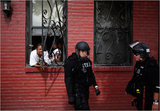
2009-09-29
Column by Richard Becker
When I arrived in Pittsburgh last Wednesday, a post-rain mist had settled over the abandoned steel mills and many bridges that stretch across the city’s three rivers. Below, in the streets, silence abounded. But something was amiss.
Above, the sky was streaked with black helicopters swarming the city like venomous wasps. The bridges lay hauntingly bare, their entrances blocked by camouflaged Humvees and paddy wagons. On each street corner, National Guard troops recently returned from Iraq stood ready in riot gear to quash what they were sure would be a violent uprising of the people.
In short, Pittsburgh had been transformed into a police state.

But it wasn’t the typical, run-of-the-mill police state to which we’ve all become resignedly accustomed. This was bordering on martial law, and it cast a pall over the activities to come. The occasion for my visit was the meeting of the Group of 20, or G20, a group of several dozen (more than twenty) world leaders from the planet’s richest nations. Their gathering always draws protest, and when I was given the opportunity to go, I took it.
I journeyed to Pittsburgh at first simply as a political tourist. However, after being surrounded by so many diverse and politically engaged citizens as I was among the gathered protesters, I was swept up by the energy of it. For weeks the mainstream media had devoted themselves to ginning up the locals into believing the arrival of protesters was tantamount to the arrival of the Four Horsemen of the Apocalypse. They painted a macabre portrait of anarchists amassing in suburban streets to destroy the city. While there was some property damage, it was far from widespread, and, when compared to the amount spent on security, the ridiculousness of the police-state setup was revealed.
Though I felt I had little in common with many of the constituency groups gathered in Pittsburgh, I wanted to go to stand in solidarity with them as they took to the streets in much the same way as our founders did hundreds of years ago as they similarly confronted injustice and repression.
While the response from the traditional media was less than uplifting, the real slap in the face came from President Obama, who dismissed our dissent last week as being based on “abstractions.” I would like to remind the president there is no such thing as abstractions for the billions of working people all over the world who are affected by the policies of the G20. Hunger is not an abstraction. Poverty is not an abstraction. The enormous profits gleaned from the blood of dead civilians the world over is not an abstraction.
These are real issues that affect real people. These are issues with faces.
As we marched through the streets of Pittsburgh past lines of faceless police in riot gear, abstractions were not on our mind. We were marching for the people whose lives are unjustly held in the hands of a few dozen world leaders from the planet’s richest countries. But we were also marching for our rights; marching because we believe that, as Robert F. Kennedy once said, “each generation must win its own struggle to be free.” We live in a society that is wary of dissent and even more suspicious of those who would dare to take the streets in defense of what they believe.
If we are to preserve our liberty to assemble and raise our voices in dissent, we must recognize, as activist and writer Naomi Wolf writes, that we have “a duty to protest injustice and overthrow tyranny.” It is in our blood to do so, but it will not long remain if we allow ourselves to be subdued by the subtle forces which are, at the very least, ignoring our right to assemble — through delay tactics for permits and other regulations — or at the worst, enforcing, with the use of riot police, roadblocks, tear-gas and pepper spray, their assertion that we do not have the right to protest.
I have no doubt that I will be castigated as a result of this column. This is to be expected. Some will say the suggestion of repression in a country like the United States is melodrama or hyperbole. I firmly reject that notion … but with one caveat: as activist scholar Noam Chomsky says, “whatever repression … we have to confront (in the United States) is nothing compared to what people face anywhere else (in the world).” The fact we were prevented at nearly every turn from marching on whichever streets we wanted and that many of the gatherings in Pittsburgh were loudly declared “unlawful assemblies” warranting police brutality and mass arrest, lends credence to the suggestion of repression in the United States. This repression takes many subtle forms, and through the forces of the mass media and other information outlets, we have been conditioned both to not recognize these forces, or if we do, to lack the will to do anything about them.
We must fight for our freedom of assembly and freedom of speech, and that’s why I took the streets last week in Pittsburgh.